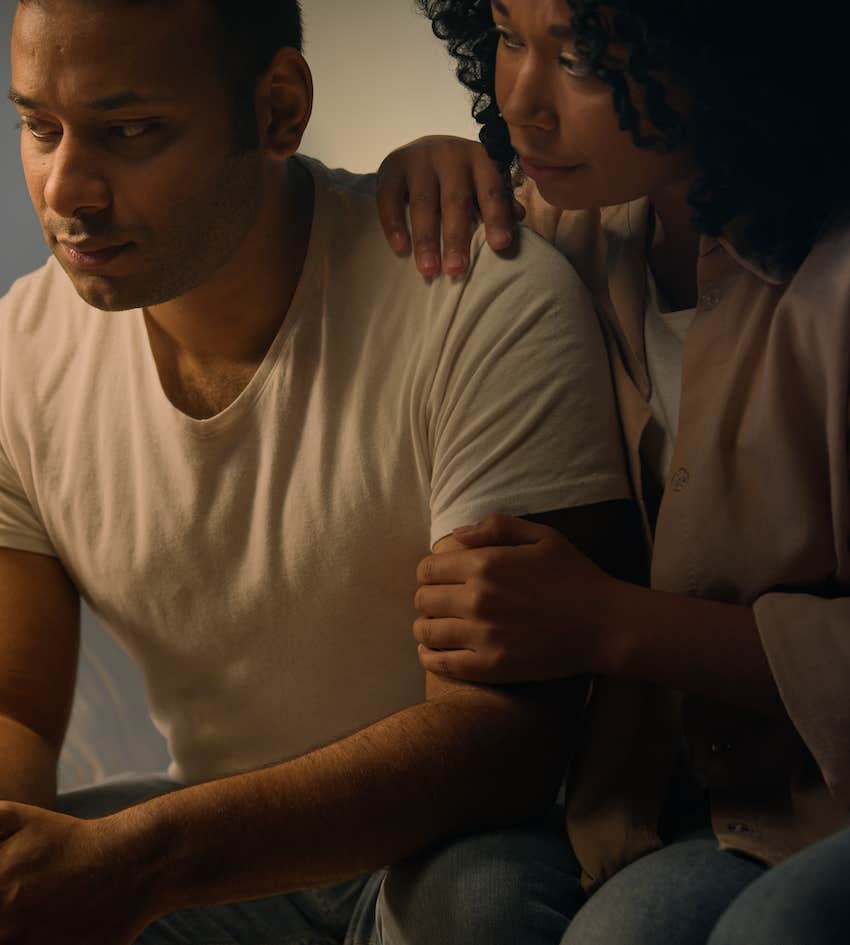5 Attractive Habits Of People Who Open Up Emotionally In Their Relationships
There's a reason some relationships last forever.
 Getty Images | Unsplash
Getty Images | Unsplash For many of us, being vulnerable in a relationship can be scary. Fear of intimacy is the main reason people do not open up, emotionally, with another person. That's also what sets truly attractive people apart: they open up emotionally in relationships.
Fortunately, fear of vulnerabilty is not a life sentence and there's much we can learn from those people who are emotionally open. It starts with practicing a few skills and turning them into habits so you can open up to people — even in romantic relationships (where it can sometimes be an even greater challenge).
Five ways people learn how to open up emotionally in relationships
1. They know how to identify their body's sensations
You put your finger on what you're feeling by becoming aware of your body's movements and sensations. Are you feeling a tightness in your chest? Does your heart hurt? Are you smiling or frowning? These are simple things, but over the course of a lifetime, we learn to ignore them and just keep moving.
Once you notice your body's sensation, you can pinpoint the feeling associated with it.
You can find many terms to describe your feelings through a quick Google search. Look up "feeling words" and pick a list of terms you identify with. Keep an emotional tracker and jot down words four or five times a day.
Document what you are feeling at breakfast, lunch, dinner, and bedtime for one week, and look for any trends or patterns.
2. They learn to talk about their feelings
After identifying your feelings you can choose to share them with your primary love interest or partner. If this is new to you, you are going to feel uncomfortable, which is normal. If it's extra tough, try writing them down in a journal.
The more you practice sharing your feelings the more natural it will feel.
You always have the choice to not share your feelings or waiting for them to become more clear. By withholding your feelings for long periods of time, however, you are choosing to limit the level of intimacy between you and your partner. Your partner can't know the real you unless you let them into your world by opening up.
Psychologist Margaret Paul explained, "Nothing else really comes close to the experience of sharing our deepest thoughts and feelings with another, of being deeply seen and known, of sharing love, passion, creativity, laughter and joy. The experience of intimacy fills our souls and takes away our loneliness. Why, then, would someone pull away from love and have a fear of intimacy?
"It is not actually the intimacy itself that people fear. If people could be guaranteed that intimacy would continue to be a positive experience, they would have no fear of it. What they fear is the possibility of getting hurt as a result of being intimate with another."

3. They listen with intention
Sharing your feelings is the starting point. You also can choose to listen to your partner's feelings.
This may be challenging if you have not listened with intention before.
You will want to give your undivided attention. Listening to your partner is not the time to multitask (playing a video game while watching TV and trying to listen to your partner at the same time will not work well.)
Turn off the technology and maintain eye contact with your partner. This isn't just anecdotal, a review in Current Opinion in Psychology found that "high-quality listening signals listeners' prosocial motivation and enhances the perceived relational value of both listeners and speakers." In other words, both partners feel better about the relationship when they make it clear they're listening with intention.
4. They make a point to validate each other
As children, you may have gotten the message that it's not okay to express your emotoins — or even to feel them deeply.
Were you told 'Stop your crying or I'll give you something to cry about?' Phrases like this invalidate a child's ability to define her own experience and feelings, and can follow people into adulthood in ways we don't even realize.
Validating feelings helps a person to trust their own emotions, as well as, listening and repeating back your partner's feelings in your own words, expressing you understood what you heard, and asking your partner if they want advice or ideas for problem-solving. Be ready for them to say no.
5. They expect to make mistakes and then learn from them
 Maya Lab via Shutterstock
Maya Lab via Shutterstock
Learn from your relational mistakes. We all make them, and we will all continue to make them. IT's not a character defect to make mistakes!
Each emotional or behavioral mistake is an opportunity to learn more about yourself and your partner. Learning about each other's feelings is the way to develop your emotional intelligence.
The more you learn, the deeper your relational intimacy becomes. Learning to do these steps will rock your world and can expand your happiness.
Licensed therapist Terry Gaspard advised, "While all relationships present risks, they are risks worth taking. Even if you have been abandoned or cheated on, you can surrender your shield and allow your partner in. Healthy partnerships are within reach if you let go of fear and believe you're worthy of love and all of the gifts it has to offer."
The loneliness you are feeling now will be replaced by safety, tenderness, and a newfound closeness between you and your partner.
Feeling emotionally connected will have an amazing effect on your physical relationship, too. The rewards of opening up to another person are profound.
Vulnerability is the key to emotional intimacy. Sharing your innermost feelings and being accepted is a basic human need and can be incredibly healing. Once you choose to open up in your relationship and put in the effort, the rewards are boundless.
Teresa Maples-Zuvela, CMAT, CSAT, LMHC, MS, is a licensed mental health counselor who specializes in working with women who have experienced betrayal in intimate relationships.

